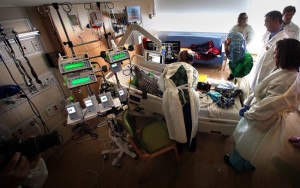Two HIV-positive patients are reportedly clear of the virus following bone marrow transplants.
The men, who were being treated at a hospital in Massachusetts, had developed lymphoma, probably as a consequence of the long-term drug therapy required to control their HIV. The prescribed treatment for lymphoma – a form of blood cancer – is a stem-cell transplant, which involves replacing bone marrow with that of a healthy donor. Dr Timothy Henrich and his team of doctors at Brigham and Women’s Hospital in Boston say they have been unable to find any trace of HIV infection since the transplant.
While it is too early to say the virus has disappeared forever, one of the men has been off antiretroviral drug treatment for 15 weeks and the other for seven weeks.
Timothy Ray Brown, known as The Berlin Patient, was cured of HIV in 2007 following a stem-cell transplant but the bone marrow he was given was from a donor with a rare genetic mutation know to provide resistance to HIV/AIDS. The two Boston patients who appear to have also been cured, although clinically it is still too early for them to be given the ‘all-clear’, were given bone marrow from a donor without this key mutation, known as CCR 5 Delta 32.
While the news is promising in the quest to slow down the spread of HIV, stem-cell therapy is not considered viable as a widespread treatment on the grounds of cost.
Kevin Robert Frost, chief executive officer of the Foundation for AIDS Research said in a statement: “Dr Henrich is charting new territory in HIV eradication research.”
Two years ago, a baby born with HIV was “functionally cured” of the virus, having be treated with a cocktail of antiretroviral drugs 30 hours after birth. It is this unusually early intervention that is thought to have been key to the successful outcome.
Scientific advances since HIV was first discovered more than 30 years ago mean the virus is no longer a death sentence and the latest antiretroviral AIDS drugs can control the virus for decades.
But many people still do not get therapy early enough, prompting the World Health Organization to call f









